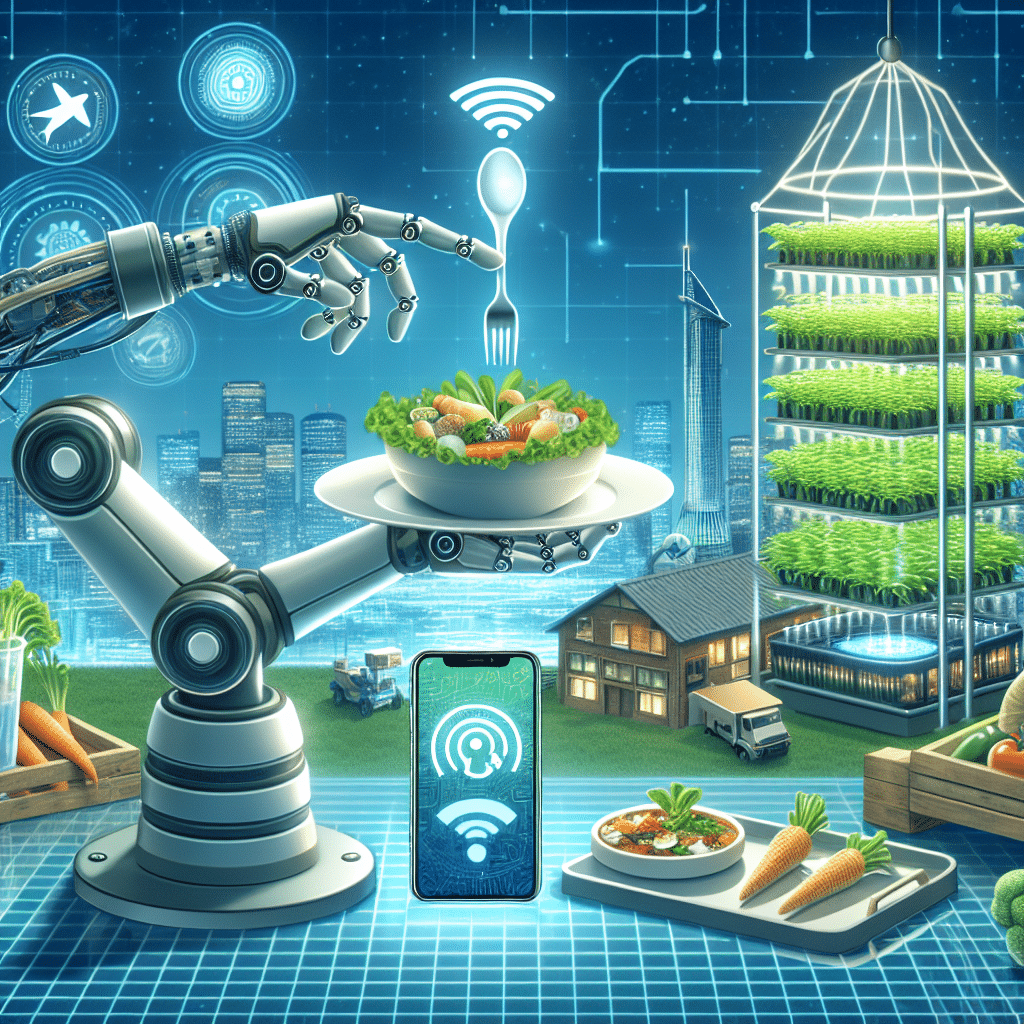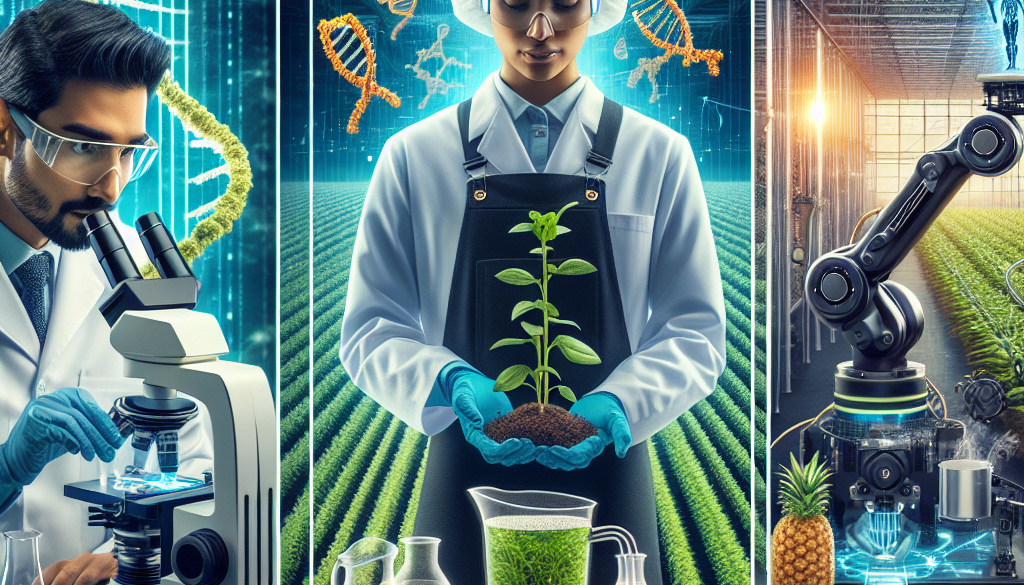Top 3 Technologies Changing the Food Industry
-
Table of Contents
Revolutionizing the Food Industry: Top 3 Technologies to Watch

The food industry is undergoing a transformation, driven by innovative technologies that are reshaping the way we produce, process, and consume food. These advancements are not only making food production more efficient and sustainable but are also enhancing the nutritional value and safety of our food. In this article, we will explore the top three technologies that are changing the food industry, providing valuable insights and statistics to understand their impact.
1. Precision Agriculture and Farming
Precision agriculture is a farming management concept that uses information technology and a wide array of items such as GPS guidance, control systems, sensors, robotics, drones, autonomous vehicles, variable rate technology, and automated hardware to optimize field-level management regarding crop farming. Here’s how precision agriculture is revolutionizing the food industry:
- Data-Driven Decisions: With the help of big data analytics, farmers can make informed decisions about planting, harvesting, and crop management, leading to increased productivity and reduced waste.
- Resource Efficiency: Precision agriculture allows for the precise application of water, fertilizers, and pesticides, which minimizes environmental impact and reduces costs. For instance, GPS technology can reduce overlap in planted rows by up to 90%, according to the USDA.
- Yield Optimization: By monitoring crop health and soil conditions, farmers can optimize yields. Drones, for example, can increase yields by 5-10% through improved crop monitoring, as reported by the Association for Unmanned Vehicle Systems International.
Precision agriculture is not just a trend; it’s becoming a necessity as the global population continues to grow and the demand for food increases. The market size for smart agriculture is expected to reach $13.50 billion by 2023, according to a report by MarketsandMarkets.
2. Food Safety and Traceability Technologies
Ensuring the safety and traceability of food is paramount for consumer health and trust. Technologies such as blockchain and IoT (Internet of Things) are playing a crucial role in achieving this. Here’s how these technologies are enhancing food safety and traceability:
- Blockchain for Transparency: Blockchain technology creates a transparent and unalterable record of food products’ journey from farm to table, enhancing traceability and accountability. For example, Walmart uses blockchain to trace the origin of over 25 products from 5 different suppliers.
- IoT for Real-Time Monitoring: IoT devices can monitor the condition of food during transport and storage, ensuring that it remains within safe temperatures and conditions. The global IoT in the agriculture market is projected to reach $48.71 billion by 2025, according to a report by Grand View Research.
- AI for Contamination Detection: Artificial intelligence can help detect contaminants in food products, reducing the risk of foodborne illnesses. AI in the food and beverage market is expected to grow at a CAGR of 42.18% from 2019 to 2024, as per a report by BIS Research.
These technologies not only protect consumers but also help food producers and retailers avoid costly recalls and reputational damage.
3. Alternative Proteins and Food Innovation
The quest for sustainable and ethical protein sources has led to the rise of alternative proteins. Plant-based proteins, lab-grown meat, and insect protein are gaining traction as environmentally friendly and humane alternatives to traditional animal proteins. Here’s how these innovations are shaping the future of food:
- Plant-Based Proteins: Companies like Beyond Meat and Impossible Foods have popularized plant-based meat alternatives, which are now widely available in supermarkets and restaurants. The plant-based meat market is expected to be worth $27.9 billion by 2025, according to a report by MarketsandMarkets.
- Cultured Meat: Lab-grown meat, also known as cultured meat, is produced by cultivating animal cells in a lab. This process could drastically reduce the environmental footprint of meat production. The cultured meat market is anticipated to reach $572 million by 2025, as reported by Allied Market Research.
- Insect Protein: Insects are a sustainable and high-protein food source that requires significantly less land, water, and feed compared to traditional livestock. The edible insects market is projected to grow to $4.63 billion by 2027, according to a report by Meticulous Research.
These alternative proteins are not only sustainable but also offer new culinary experiences and health benefits, making them an exciting area of growth in the food industry.
Conclusion
The food industry is at the cusp of a technological revolution, with precision agriculture, food safety and traceability technologies, and alternative proteins leading the charge. These innovations are making food production more efficient, sustainable, and safe, while also offering new options for consumers who are increasingly concerned about health and the environment. As these technologies continue to evolve, we can expect to see even more significant changes in the way we grow, process, and consume food.
Enhance Your Diet with ETprotein’s High-Quality Protein Products
If you’re looking to incorporate high-quality, sustainable protein into your diet, ETprotein offers a range of organic bulk vegan proteins and L-(+)-Ergothioneine (EGT) products. Their offerings include a variety of plant-based proteins such as rice, pea, watermelon seed, pumpkin seed, sunflower seed, mung bean, and peanut proteins. ETprotein’s products are characterized by their neutral taste, non-GMO, allergen-free attributes, and high purity levels, making them an excellent choice for consumers and manufacturers alike.
About ETprotein:
ETprotein, a reputable protein and L-(+)-Ergothioneine (EGT) Chinese factory manufacturer and supplier, is renowned for producing, stocking, exporting, and delivering the highest quality organic bulk vegan proteins and L-(+)-Ergothioneine. They include Organic rice protein, clear rice protein, pea protein, clear pea protein, watermelon seed protein, pumpkin seed protein, sunflower seed protein, mung bean protein, peanut protein, and L-(+)-Ergothioneine EGT Pharmaceutical grade, L-(+)-Ergothioneine EGT food grade, L-(+)-Ergothioneine EGT cosmetic grade, L-(+)-Ergothioneine EGT reference grade and L-(+)-Ergothioneine EGT standard. Their offerings, characterized by a neutral taste, non-GMO, allergen-free attributes, with L-(+)-Ergothioneine purity over 98%, 99%, cater to a diverse range of industries. They serve nutraceutical, pharmaceutical, cosmeceutical, veterinary, as well as food and beverage finished product distributors, traders, and manufacturers across Europe, USA, Canada, Australia, Thailand, Japan, Korea, Brazil, and Chile, among others.
ETprotein specialization includes exporting and delivering tailor-made protein powder and finished nutritional supplements. Their extensive product range covers sectors like Food and Beverage, Sports Nutrition, Weight Management, Dietary Supplements, Health and Wellness Products, and Infant Formula, ensuring comprehensive solutions to meet all your protein needs.
As a trusted company by leading global food and beverage brands and Fortune 500 companies, ETprotein reinforces China’s reputation in the global arena. For more information or to sample their products, please contact them and email sales(at)ETprotein.com today.












